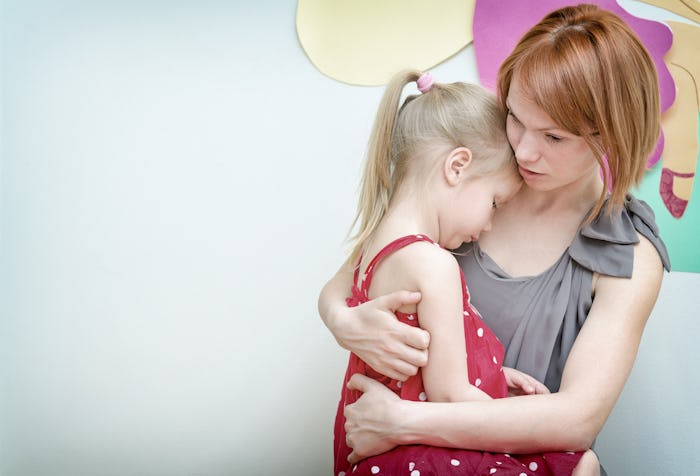Life
6 Questions To Ask Your Child If You Think They Are Being Sexually Abused
One of the most difficult and heartbreaking things parents can face is the potential for harm to their children. No one wants to think about it, but abuse is a fact of life for far too many kids. If you are in the difficult place of suspecting harm, then it's crucial to talk to your child about abuse in an age-appropriate and gentle way. It will doubtless be a tough conversation for you as well, but this burden of parenthood comes with the territory.
In general, it's important to approach your child in a caring, non-stressful way to begin the conversation. Understand that your child may have difficulty addressing the subject even if you have all the love and trust in the world. By opening up the conversation, and making sure your child knows you two can talk about anything, you can also set the stage for these more difficult questions.
If you suspect your child is in any immediate danger, then don't hesitate to alert authorities at once. Any signs of physical abuse should be examined right away at a hospital or other healthcare facility. For advice and referrals to local sources of help, call the Childhelp National Child Abuse Hotline at (800) 4-A-CHILD or (800) 422-4453.
1"Have you ever been hurt by a person taking care of you?"
Clear but open-ended questions are a good place to start the conversation. As explained by the Do Right By Kids website, such general questions about physical abuse should be asked in a gentle manner. It gives the child a chance to open up and provide information without too much pressure.
2"Is anyone touching you in a way that's doesn't feel good?"
Discussing the topic of unwanted touching with your child may be uncomfortable, but it's crucial to maintain an open dialogue. Explaining sexual abuse to young kids can be tricky, though, so it's important to use language and concepts that the child will understand. As noted by the Fort Bend Women's Center, asking whether your child has been touched in a way that's weird or did not feel OK is another avenue to start the conversation.
3"Are you afraid to tell? Telling me anything is OK."
Along a similar line as the secret-keeping, sometimes kids who have been abused will be reluctant to talk about the abuse for other reasons. Addressing the discomfort outright is a good choice. Assuring your kid that no information they share will get them in trouble is another way to keep the communication strong, as noted by the U.S. Department of Justice. Make sure the kid knows you can be told anything.
4"Has anyone asked you to keep a secret from me?"
Even the most chatty kids can get cowed into silence if an adult asks them to keep a secret. As further noted by the Fort Bend Women's Center, it's important to talk to your child about secrets, and reassure them that it's OK to tell you anything. In general, an adult asking your kid to keep secrets from you is pretty suspicious anyway.
5"Is everything OK?"
Kids who have faced abuse may have trouble putting the experience into perspective and coming to you for help, even if you have a close, trusting relationship. It's sometimes a good idea to approach the question in a general way. "Give reassurance that you’re there to listen," said Mike Canning, a helpline manager for the National Society for the Prevention of Cruelty to Children in The Metro. "If a child backs off that’s fine, just raise the question little and often. Say things along the lines of: 'Is everything OK? We trust you, you can tell us. We will support you.'" That reassurance can be everything.
6"What happened?"
Most resources about this subject stress the importance of not interrogating the kid or trying to lead them with specific questions. If your kid does start revealing some troubling details, then it's important to keep your cool and let them keep talking. Simply asking open-ended questions and letting the child tell the story in his own words is key, according to ChildSafe. Depending on what the kid is telling you, though, this may prove a little difficult. It's tough to hear your kid reveal potential instances of abuse, even if you have suspected it for some time.
Check out Romper's new video series, Bearing The Motherload, where disagreeing parents from different sides of an issue sit down with a mediator and talk about how to support (and not judge) each other’s parenting perspectives. New episodes air Mondays on Facebook.
